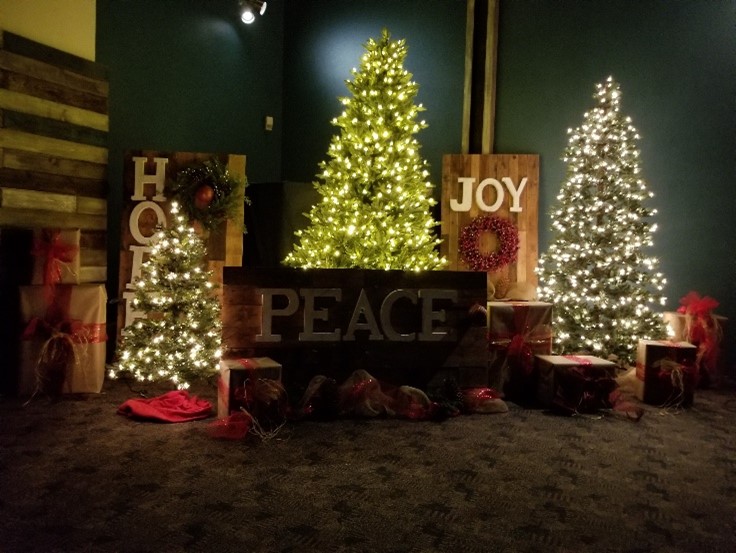By Dan Amos

I don’t remember much about Christmases as a kid. I know we had a tree and lots of things wrapped under it. We didn’t have a lot in those days, but my mom and my dad, who was expressionless in words, loved us in giving what they could. I think we would open presents in the morning but got to open one on Christmas Eve. But the first Christmas I really remember something specific was probably in the month of April. I may be combining years, but only my mom and sisters could say differently. My dad had been away on an exceptionally long cruise aboard the USS Oriskany operating near Vietnam. He returned in the spring, and we waited to celebrate until he returned home. That “Christmas” morning I found a train set with a five-dollar bill wound up tightly and sticking out of a window of the caboose. The five is gone, but I still have the train set.
When I think of Christmas, I want it to be more than presents and things. Santa has never been anything more than a cartoon for me, but even the nativity is only part of the story. The first two chapters of Matthew and Luke are pretty much all we have telling us the account of Jesus’s birth, but they are packed with world-changing events.
Zechariah, Elizabeth, and John were relatives of Jesus, and John’s birth about six months ahead of Jesus’s birth puts a whole different light on Luke chapter 3 and the ministry of Jesus’s cousin John. This is the John who preached a baptism of repentance for the forgiveness of sins. It is the John who would baptize Jesus and kick off his ministry, and John who would be martyred for his faithfulness.
Luke chapter 1 also tells of Mary, the young woman who was visited by an angel and told of her favor with God. She conceived Jesus because “the Holy Spirit will come on you, and the power of the Most High will overshadow you. So the holy one to be born will be called the Son of God.” A virgin, pledged to be married, but never having been intimate with a man, was pregnant. She lived in a small town in a time when it was unacceptable to be pregnant out of wedlock.
In Matthew chapter 1, we are told of Joseph learning of Mary’s pregnancy and his intent to break ties with her. The angel of the Lord visited Joseph, and he heard of the child Mary would bear. Matthew doesn’t name the angel, but Gabriel was the messenger to Zechariah and to Mary.
Luke chapter 2 tells of the journey to Bethlehem, the birth of Jesus, and the celebration in heaven where the worship spilled over to the Earth. Matthew 2 picks up the story a time later, when the Magi came looking for the king. They had seen a star rise and interpreted it as the sign of a king’s birth. Once in Jerusalem, the star led them to Bethlehem, where it no longer moved.
Herod knew the prophecy of the birth of a king, and when he heard the Magi were looking for him, Herod was scared for his own future. He schemed to get the Magi to lead him to the infant king and sent them to find Him. They did find Jesus and presented Him with the expensive gifts that we all know—gold, frankincense, and myrrh. Then they were warned in a dream not to return to Herod.
Joseph was then warned to take his family to safety in Egypt. When Herod realized the Magi wouldn’t be telling him where to find the infant king, he ordered his men to kill all the boys in Bethlehem who were two years old and under. But Jesus and His family were kept safe in Egypt until Joseph was again told to return home because Herod was dead.
So, Christmas is more than elves and reindeer, presents, family and parties. Christmas is a miraculous working of the Holy Spirit, foretold in Scripture, revealed in events, and it reveals the worst of mankind, politics, trickery, and murder. But in the end, the intricate weaving of events is the stage from which Jesus would be revealed decades later when the other baby of the Christmas story declared, “Behold, the Lamb of God!”
It’s a huge story of intimate local events to global politics and stellar movements. It would be impossible to put together unless you were writing about it from a perspective of knowing the end from the beginning. Matthew and Luke were inspired to write by the Holy Spirit. That’s our God. At the time of our first sin, he already knew the plan of redemption, of how he would fix the mess we made. Jesus, the Lord saves. Merry Christmas!
Views – 221
 Follow
Follow
